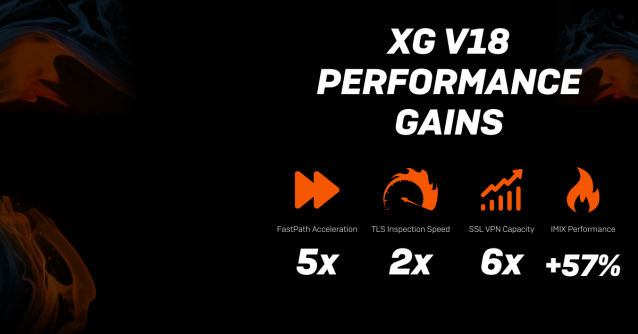XG Firewall v18 includes several performance gains that will breathe new life into your network, enabling you to handle more traffic and better secure it.
If you haven’t upgraded to XG Firewall v18 already, you’re going to want to do so as soon as possible to take advantage of the substantial performance benefits waiting for you.
What are the gains and where do they come from?
Consider these potential performance boosts available by upgrading to XG Firewall v18:
Those are some impressive performance improvements!
One of the most exciting enhancements to XG Firewall in v18 was the introduction of the new Xstream Architecture, with its all-new streaming DPI engine, advanced TLS 1.3 inspection solution, and Network Flow FastPath.
Let’s look at how the Xstream Architecture upgrades your performance:
Trusted traffic FastPath acceleration
The new Xstream Network Flow FastPath is all about performance. It directs trusted traffic that doesn’t require security scanning into a fast lane through the system. This not only minimizes latency and accelerates application traffic through the firewall, it also has the added benefit of not engaging the DPI engine for deep-packet inspection of trusted traffic.
The impact of fast-pathing is up to a 5x improvement in firewall traffic throughput! Of course, with a blend of real-world traffic mixes, not all applications qualify for trusted traffic FastPath acceleration, but if a substantial portion of your traffic can be accelerated on the FastPath, you could increase your firewall’s security scanning capacity while allowing more trusted traffic. That’s a win-win.
Be sure to see how to make the most of the Network Flow FastPath on your network to learn how this works and how to set it up optimally.
TLS inspection speed
The new Xstream TLS inspection solution also brings a tremendous boost in decrypting and inspecting encrypted traffic flows, with up to a 2x improvement in performance. And when you combine the added performance with the very granular and easy to manage TLS inspection policies, you can be sure you’re only inspecting traffic that really needs it – and now do it faster than ever.
See how to make the most of Xstream TLS Inspection on your XG Firewall.
IMIX traffic performance
Internet Mix or IMIX is an often used reference in measuring typical real-world internet network traffic performance, making it a good metric to consider when looking at performance.
The new Xstream architecture in XG Firewall v18 brings a substantial boost in performance to this important metric. On our mid-range firewall models, the gains are over 100%, with the average across the XG Series line being a 57% improvement in performance.
This is all thanks to optimizations in the packet processing flow, DPI engine, and Network Flow FastPath. It’s an incredible real-world improvement in traffic processing performance.
Other common traffic performance measurements also benefit from the Xstream architecture in v18, including raw firewall performance, IPS, AV, application control, and malware protection.
Get the latest XG Firewall brochure to see the latest performance metrics and how your XG Series model stacks up.
SSL VPN capacity
Further optimizations to our SSL engine in XG Firewall v18 MR3 bring some dramatic improvements to remote access SSL VPN capacity, with up to 6x the number of connections possible on our higher-end appliances.
Increases are more modest at the entry-level, but on a typical mid-range device like the XG 310, the capacity has tripled! This is great news for everyone managing a remote workforce these days.
Check out the other great enhancements with remote-access VPN.
Upgrade today
If you haven’t already, upgrade to XG Firewall v18 today. It’s a free performance boost, and you get a ton of great new protection and networking features.
Be sure to take advantage of all the resources available, including the recent “Making the Most of XG Firewall v18” article series that covers all the great new capabilities in XG Firewall v18:
- Xstream architecture, DPI engine, and TLS inspection
- Xstream TLS Inspection for a modern encrypted Internet
- FastPath Application Acceleration and SD-WAN Routing
- Zero-day threat and ransomware protection
- Network address translation (NAT)
- Route-based IPsec site-to-site VPN

